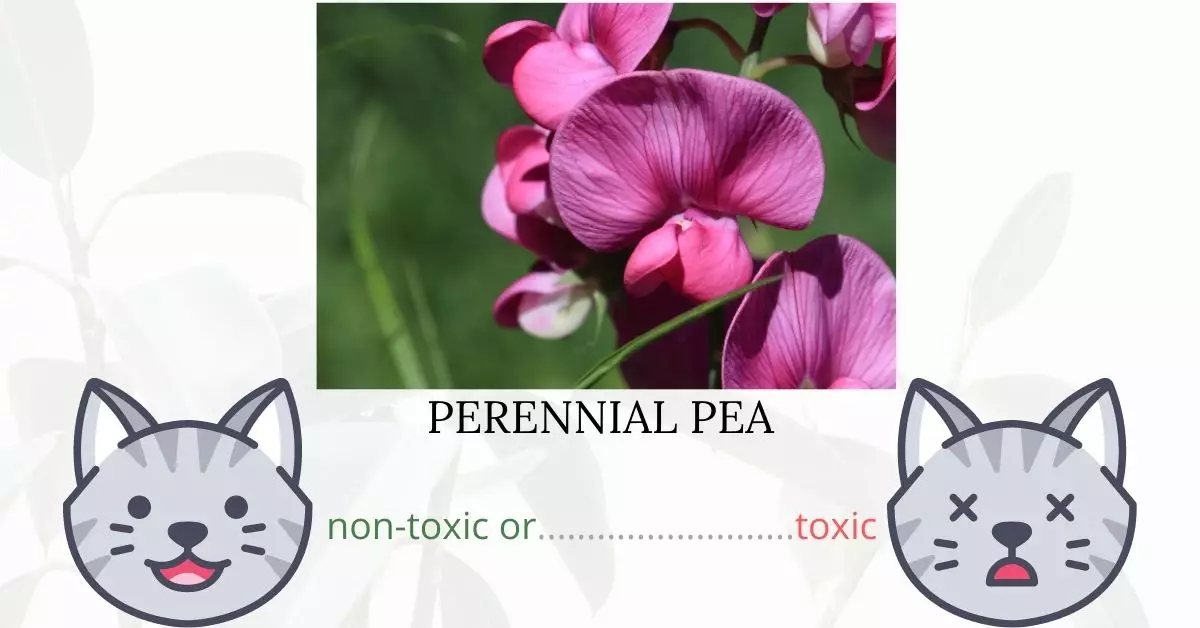To answer the query promptly, yes, the perennial pea, also known as sweet pea, is toxic to cats due to the presence of a chemical called ‘aminopropionitrile’ predominantly found throughout the plant, with the highest concentration in the seeds. This neurotoxin infiltrates tissues and neutralizes the neurotransmitter glutamate upon consumption, disrupting the brain’s capability to transmit messages through the neurological system and thereby regulate the body.
This article is composed with the invaluable collaboration of a group of seasoned Doctors of Veterinary Medicine (DVMs). Their profound knowledge and insights enable us to deliver precise and current information regarding the potential hazards related to various plants, specifically, the perennial pea in this context, and their impact on cats. Furthermore, to ensure the accuracy and reliability of our information, we have conducted thorough research consulting high-authority websites such as the ASPCA and PetMD for each plant discussed. Through the amalgamation of professional veterinary insights and credible resources, we aim to equip cat owners with the essential knowledge to safeguard their pets effectively.
Clinical Signs of Perennial Pea Poisoning in Cats
When a cat comes into contact with, inhales the fragrance of, or ingests the perennial pea, also referred to as the sweet pea, it might display various clinical symptoms indicative of poisoning. Each sign has its underlying cause related to the toxic effects of the plant:
- Weakness: A direct consequence of the nervous system’s reduced ability to communicate due to the interference caused by the neurotoxin, ‘aminopropionitrile’.
- Lethargy: As the toxin disrupts normal neurological functions, the cat’s energy levels drop, leading to an apparent lack of interest in activities and sluggish behavior.
- Pacing: The disrupted communication within the neurological system can lead to confusion and agitation in the cat, causing it to pace uncontrollably.
- Pressing the head: This can be a sign of increased intracranial pressure or a brain’s attempt to alleviate discomfort or pain caused by the toxin’s effect on the brain’s neurotransmitters.
- Tremors: The suppression of glutamate activity by ‘aminopropionitrile’ interferes with muscle control, leading to involuntary shaking or tremors.
- Seizures: Severe neurological disruption can lead to convulsive episodes as the brain struggles with the interference caused by the toxin.
- Failure of an organ: Prolonged exposure or consumption of the plant can lead to organ damage due to the prolonged effect of the toxin, with the most sensitive organs being at the highest risk.
If a cat shows any of these signs after coming into contact with the perennial pea, immediate veterinary intervention is essential. Even seemingly subtle signs can indicate a severe underlying issue and should not be ignored.
First Aid and Treatment of Perennial Pea Poisoning in Cats
To prevent the symptoms from returning, the vet may decide to absorb the remaining aminopropionitrile in the stomach with activated charcoal. In severe cases, the contents of the cat’s stomach may need to be pumped to prevent further damage to the body.
Other supportive treatments and medications may also be prescribed by the doctor as he may deem necessary to improve your cat’s condition.
Recovery from Perennial Pea Poisoning in Cats
Depending on how strongly the perennial pea toxins damaged the cat, it will take some time for them to recover. Before they can resume their usual life, the majority of cats will need several weeks of rest and reduced activity, with elderly cats requiring a longer time.
Prevention of Perrenial Pea Poisoning in Cats
If you have a perennial pea growing in your yards, it is best to remove it immediately. Familiarize yourself with toxic plants that may cause harm to your cats. Do your research first before planting or purchasing any plants and bringing it to your home.
If you love plants but have cats at home, check out these lists:





